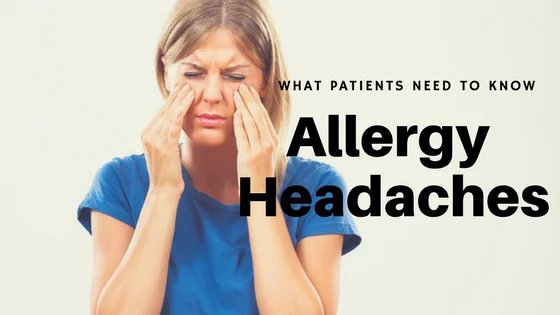Allergy Headache: What Patients Need to Know to Relieve Allergy Headaches

updated Sep 2023
It’s estimated that nearly 70-80% of Americans experience headaches. Those who suffer from allergies already have to deal with rashes, difficulty breathing, congestion, and a host of other unpleasant side effects. Yet, sinus headaches and even migraines can also be added to this list of allergy side effects.
While headaches aren’t typically life-threatening, they can affect your quality of life. If you suffer from allergies and headaches, here’s what you need to know and how to treat them.
Symptoms of an Allergy Sinus Headache
Your sinuses are hollow air spaces which allow the exchange of air and mucus. These passages are located behind the eyes and the bridge of the nose, in the forehead, and inside each cheekbone. Any secretions in the sinus cavities typically drain into the nose.
Sinus pain is caused when the sinuses are swollen, filled with fluid or the openings are obstructed. Any obstruction stops normal drainage and causes pressure to build up inside. Many times, the pain is in relation to the affected sinuses. Sinusitis pain can be dull or intense and often is worse in the morning hours after you wake up.
How are Allergy Headaches Different from Other Types of Headaches?
“Allergy headaches” are a common complaint of people who struggle with environmental allergies. They typically occur when the body’s immune system reacts to a foreign substance, such as pollen, dust, or animal dander. The immune system responds by releasing histamines and other chemicals, which can cause inflammation and swelling within the nasal passages and sinuses. This sudden inflammation can lead to a pressure and pain sensation in the face and head, resulting in –what some call– an allergy headache.
By contrast, other types of headaches have different triggers and causes. For example, tension headaches can be caused by stress or tension in the muscles of the neck and head or injury to those muscles. Migraine headaches are thought to be caused by unclear vascular and neuronal changes in the brain and can be triggered by factors such as hormonal changes or sensory stimuli (such as bright lights or strong smells).
Allergy Headache Triggers
Allergies can trigger sinus pressure and headaches from several sources. The most common allergens and triggers include:
- Certain foods
- Dust
- Pet Dander
- Pollen
- Sinus congestion
- Smoke
- Stress
What Does a Pollen Allergy Headache Feel Like?
Allergy headaches can also be distinguished from other types of headaches by their symptoms.
A pollen allergy headache often feels like a dull or throbbing pain in the temples or forehead and throughout the nose and cheekbone areas. The pain may be accompanied by pressure or a sensation of fullness in the head.
In addition to the headache pain, allergy headaches can cause other symptoms such as bothersome nasal congestion/obstruction, pressure and pain surrounding the nose, forehead, and cheekbones. Also, nasal drainage, itchy or watery eyes, and sneezing can also accompany allergy headaches. These symptoms are not typically seen with tension or migraine headaches. Some people may also experience fatigue, irritability, or difficulty concentrating during a pollen allergy headache.
Managing Allergy Headaches and Triggers
The key to managing your allergies and reducing headaches is limiting exposure to allergens and triggers.
- Stay indoors and keep the windows shut when pollen counts are high.
- Wear glasses or sunglasses outdoors to keep pollen from getting in your eyes.
- Use the air conditioning in your home and in your car. Make sure to change out the air filters regularly and keep AC units clean.
- Use mite-proof covers in your bedroom for pillows, comforters, and mattresses to reduce exposure to dust mites.
- Keep your home’s humidity at 30-50% to reduce exposure to mold. Clean your kitchen, bathrooms, and basement regularly and use a dehumidifier in damp, humid places.
- Wash floors with a damp mop or rag to avoid dry-sweeping or dusting.
- If you are allergic to a pet, keep them outside of your home. If a pet must be kept indoors, keep it out of the bedroom so you are not exposed to allergens while you sleep.
- Replace carpeting with hardwood, tile or linoleum to reduce dander in the home.
Many sinus headache triggers are airborne and difficult to avoid. Discuss your options with your allergist to decide which treatment options are best for you.
How to Treat Allergy Headaches
If your allergy headaches persist, your allergist may recommend one or more of the following treatments to offer the best options for allergy headache relief.
- Pain Relievers: Advil (ibuprofen) and Tylenol (acetaminophen) can offer short-term relief for sinus pain.
- Oral & Nasal Decongestants: Available in over the counter (OTC) medications, these can treat nasal congestion and relieve pressure which causes sinus headaches.
- Antihistamines: Histamines are natural chemicals in your body responsible for your body’s response to allergens. Antihistamines help block these chemicals to reduce allergy symptoms. Both OTC and prescription antihistamines are available.
- Intranasal Corticosteroids: These medications are extremely effective at treating allergic rhinitis and help reduce sneezing, itching, nasal congestion, and runny nose.
- Immunotherapy (allergy shots): If you don’t respond well to medications or experience side effects, allergy shots may be recommended by your allergist for a more permanent solution to an allergy problem.
If you’re experiencing sinus headaches and pain due to allergies, speak with your allergist for treatment options. Contact the professionals at the Allergy & Asthma Specialists of North Florida to schedule an appointment today.
